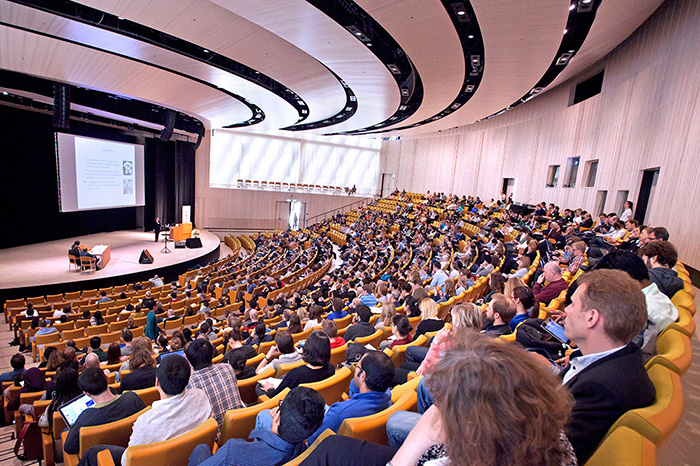SciLifeLab Day great success
More than 800 researchers, students and industry representatives from all over Sweden gathered in Aula Medica in Stockholm to listen to exciting research seminars on April 10. “It is amazing to see how life science research has evolved in the Stockholm-Uppsala region and how nice different disciplines have been put together by SciLifeLab ” said Janet Thornton, EMBL UK, who was one of the days keynote speakers.
The first speaker to enter the stage was Craig Venter, founder of the J. Craig Venter Institute and also the first person ever to have his genome sequenced. He gave an overview of his famous, and sometimes said to be controversial, research; from converting the analog genetic code to digital and reverse, to the construction of synthetic life. “Life is a DNA software system: If you change the DNA you ultimately change the species of the cell” said Craig Venter. “We hope to have a cell completely designed in a computer later this year.”
Mathias Uhlén, Director of SciLifeLab, gave an overview of what the national center offers in terms of analysis, technology and competence. He also pointed out that SciLifeLab is still growing, both in number of researchers and the articles they publish, as well as in activities like the Science and SciLifeLab Prize for Young Scientists and the recently opened call for the first national research projects.
Jan Ellenberg, EMBL Germany, showed films from his lab showing cell mitosis in high resolution. The films are part of his groups work to understand the molecular mechanism of the nuclear division cycle in the intact living cell.
During lunch and coffee breaks the participants could also visit a poster session presenting the platforms and units of SciLifeLab. “We have had a lot of visitors showing interest in our techniques and what we offer. I have made many new valuable contacts today”, said Hammou Ait Blal, KTH Royal Institute of Technology/SciLifeLab, who represented the Cell Profiling unit.
The afternoon session comprised case studies of using the SciLifeLab Units. “Using the SciLifeLab units has been a prerequisite for our research.” said Thomas Helleday, Karolinska Institutet/SciLifeLab, who’s work on a new possible cancer drug was recently published in the journal Nature. “A medical company would not have been able to put efforts in such early research”.
The case studies were followed by talks by Janet Thornton, EMBL UK, and Svante Pääbo, Max Planck Institute, Germany. Svante Pääbo talked about his research that has revealed that we all carry remains of DNA from Neanderthals, which shows that the modern human interbred with our extinct relatives. He also revealed that men, to a larger extent than women, contacts his lab claiming to be Neanderthals living today, wanting to donate DNA for his research. Women on the other hand more often contacts him and his colleagues claiming to be married to a Neandethal. Svante Pääbo got the biggest laugh of the day from the audience.





